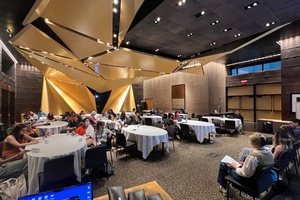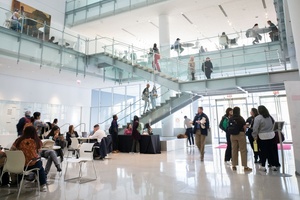Features:
What Mentorship Means and Why It’s Magic
A brief interview with SRCCON:WORK speaker Nicole Zhu

SRCCON:WORK is coming up fast. In the run-up to the event, we’re publishing short interviews with the nine people selected to give talks to frame the participatory sections at the heart of the conference. Here’s our Q&A with Nicole Zhu who will speak alongside David Yee of Vox Media “on the life-changing magic of media mentorship.”
Nicole Zhu on the Many Kinds of Mentorship
Source: Hi Nicole! Would you introduce yourself to our readers, please, and tell us a little about your experience with media mentorship so far?
I’m currently a full-stack engineer on the publishing team at Vox Media working on their story editor and content management system (read more about what that means on Source!)
Media mentorship has been one of the most significant influences on my career so far. I went into college thinking I was going to study English and maybe go to law school. I ended up studying computer science, but I still had this passion for storytelling, and I didn’t really know how I could combine those two interests. I found really great mentors at the student publication I worked at, as well as at the Knight Lab, and they really gave me the exposure to what was possible with technology and journalism. My bosses at the Knight Lab in particular (shoutout Miranda and Joe) were incredible mentors who did everything from introducing me to news nerd-y conferences and communities like NICAR, SND, and OpenNews, to answering questions I had about different kinds of roles, to checking in with me throughout the internship or job application processes.
Peer mentorship was also really important for me, because it was helpful to relate with others who were navigating the same kinds of questions and situations. It was much more informal, and was often where I got help with the more practical, nitty-gritty types of things like how to do email follow ups, preparing for interviews, doing resume critiques, or what to expect from different kinds of work environments.
Now in my current/first job, I also have a really supportive boss (shoutout David, with whom I am giving this talk), and I really wanted to pay it forward. David and I decided to pitch a talk together in the hopes of combining our experiences and lessons learned so far as both mentors and mentees, and facilitate a more frank and open discussion about what modern media mentorship looks like. New opportunities and career options are opening up left and right and so often effective mentorship doesn’t always mean asking someone, point-blank, “will you be my mentor?”
Source: Your talk description asks what meaningful advice looks like in an industry that keeps shifting—what does that look like?
For me, meaningful advice often just involves transparency and knowledge sharing about different career options, responsibilities, experiences, and expectations. I also think that meaningful advice should try to provide more suggestions than prescriptions (particularly since mentorship can happen across different roles, companies, etc.) and prompt you to continuously evaluate and reflect on your own job or career. I also think the timing of advice is crucial, for example when you’re considering or dealing with a career transition, guidance from a mentor can help unmuddy the waters or help with decision-making.
Source: What do you wish you could dig into in your talk, but won’t have the time to discuss?
I would dive deeper specifically into effective peer mentorship, since I think that dynamic is really unique and valuable to discuss, and plays a huge role in making sure people who are new to the world of journalism and technology feel supported and successful.
Credits
-
 Erin Kissane
Erin Kissane
Editor, Source, 2012-2018.
-
 Nicole Zhu
Nicole Zhu
Nicole Zhu is a writer and developer based in New York. She is an engineer on the publishing team at Vox Media and is the co-host of Sweet and Sour, a podcast that explores the common threads and nuances of the Asian American experience.



